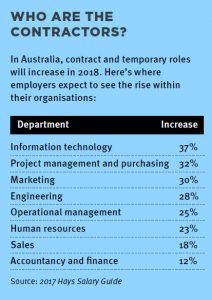Fines of up to A$63,000 per breach of getting it wrong
In Australia, 23 per cent of employers say they now regularly engage contract or temporary staff – with another 44 per cent employing them for special projects – according to the 2017 Hays Salary Guide. The Australian Bureau of Statistics estimates there are one million independent contractors currently working in Australia, representing about 9 per cent of the workforce – an increase of 2 per cent in six years.
As the number of independent contractors continues to rise, so too does close scrutiny of it by watchdog agencies such as the Fair Work Ombudsman (FWO) and Australian Taxation Office (ATO).
In 2018, the FWO has reported that the misclassification of employees as contractors is a persistent issue within many industries in Australia.
According to an FWO spokesperson the FWO has found exploitative cases of sham contracting, where businesses deliberately engaged workers as independent contractors, when they were actually part- or full-time employees. The cases involved “very serious, deliberate and systemic behaviour used to gain an advantage over competitors and resulted in large underpayments”. Migrant and young workers, in particular, may find themselves the target of sham contracting due to a number of factors, including reluctance to reach out for help for fear of losing their job, lack of awareness of workplace rights, or language barriers to properly confirm their working agreement.
Some instances of misclassifications of workers, though, have been unwitting. For instance, arrangements were either formed in partial ignorance, or began as true contractor engagements that slowly changed – unobserved and undeclared – from contractor to employee.
If someone has been engaged as an independent contractor, and the court or the Fair Work Ombudsman determines they’re really an employee, there are provisions under the Fair Work Act 2009, which enable you to be prosecuted for breach of the award, There’s a maximum fine under the Fair Work Act 2009 for a breach of the Act – up to A$63,000 per breach.
It may go further than that. Businesses may also be held legally responsible, as an accessory, if a contractor – or subcontractor – is found to be underpaying staff.
“It’s not just direct employers who can be held liable for contraventions such as underpayments,” the FWO spokesperson warns. “Any person or entity knowingly involved in contraventions could be found legally responsible.”
Put to the test
Unfortunately for businesses and workers alike, the distinction between employees and independent contractors is rarely immediately clear.
According to the FWO, there is “not a singular factor used to determine whether a worker is an employee or an independent contractor. For example, just because a worker has an Australian Business Number [ABN] or issues invoices, doesn’t automatically make the worker an independent contractor.”
ATO and FWO websites offer further information outlining the differences between employees and contractors, as well as tools to assist in determining whether a worker is an employee or contractor. Whether you’re a business or a worker, as models of employment change and contracting increases, they should be essential reading.
Workers can contact the Fair Work Infoline on 13 13 94. A free interpreter service is also available by calling 13 14 50.
Fines and penalties
According to the ATO, businesses that don’t meet required employer obligations may face penalties and charges including:
- A PAYG withholding penalty for not meeting PAYG withholding obligations
- Super guarantee charges for not meeting super obligations, comprising: super guarantee shortfall amounts (the amount of super contributions that should have been paid into a complying fund); interest; an administration fee; and penalties up to 200 per cent in the most egregious cases.

